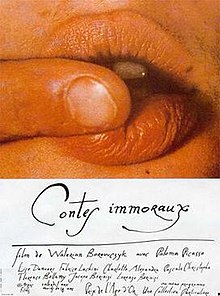Immoral Tales (film)
| Immoral Tales | |
|---|---|

Film poster for Immoral Tales
|
|
| Directed by | Walerian Borowczyk |
| Produced by | Anatole Dauman |
| Written by | Walerian Borowczyk |
| Story by | André Pieyre de Mandiargues |
| Starring |
Lise Danvers Paloma Picasso Charlotte Alexandra Fabrice Luchini Florence Bellamy Pascale Christophe |
| Music by | Maurice Le Roux |
| Cinematography |
|
| Edited by | Walerian Borowczyk |
| Distributed by | Argos Films |
|
Release date
|
|
|
Running time
|
105 minutes |
| Country | France |
| Language | French |
Immoral Tales (French: Contes immoraux) is a 1973 French anthology film directed by Walerian Borowczyk. The film was Borowczyk's most sexually explicit at the time. The film is split into four erotic-themed stories that involve the loss of virginity, masturbation, bloodlust and incest.
After the release of Immoral Tales, Borowczyk began to fall out of favor with film critics. Modern critical reception to the film is that it is not one of Borowczyk's strongest works.
The film is separated into four stories. The first story involves André (Fabrice Luchini) who takes his 16-year-old cousin (played by Lise Danvers) to the beach to perform fellatio on him in tune to the waves of the incoming tide. The second story is titled Thérése Philosophe and involves a teenage country girl (Charlotte Alexandra) who intermingles sexual desires in her imagination with her dedication to Christ after being locked in her room. The third story feature both Elizabeth Báthory (Paloma Picasso) as a countess who murders young girls in order to gain eternal youth by bathing in their blood and a girl (Marie Forså) putting pearls inside her vagina. The final story involves the daughter of Pope Alexander VI, Lucrezia Borgia (Florence Bellamy), having sex with her male relatives.
By 1972, Walerian Borowczyk was known predominantly for his various short films which were made to support feature-length releases. Borowczyk's feature films had made very little income from their theatrical releases while short films were not in demand as much as supporting features in cinemas. At this time, Borowczyk met with producer Anatole Dauman, who suggested that because France's film censors had relaxed the laws concerning censorship, Borowczyk should make an erotic feature to gain an audience.
The film's stories are taken from various sources, including surrealist writers and poets. The first story in the film is taken from surrealist writer André Pieyre de Mandiargues. The title of the second story is taken from an anonymous sacrilegious novel from the 18th century. The third story is a re-telling of the case of Elizabeth Báthory from the study of surrealist poet Valentine Penrose.
...
Wikipedia
